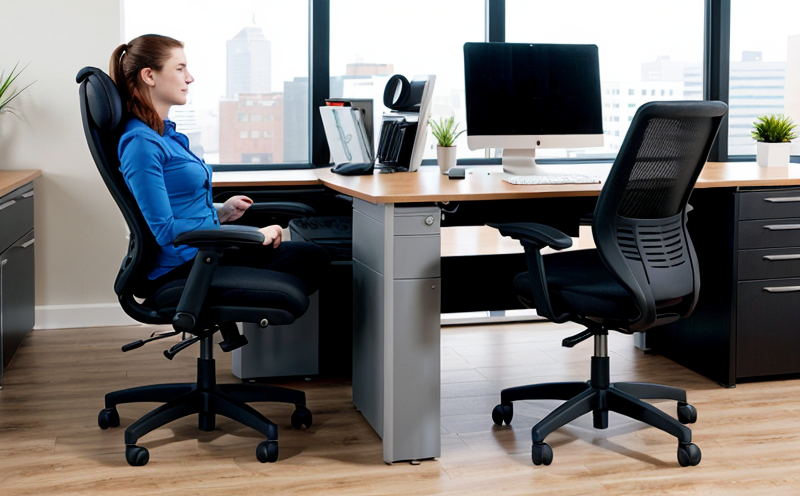ASTM F1561 Performance Testing of Office Work Chairs
The ASTM F1561 standard is a crucial benchmark in the furniture industry, specifically focusing on the performance testing of office work chairs. This service ensures that the ergonomic and functional aspects of these chairs meet stringent safety and comfort criteria. Compliance with this standard is essential for quality managers, compliance officers, R&D engineers, and procurement teams who aim to maintain high standards of product reliability and user satisfaction.
The primary purpose of ASTM F1561 testing is to evaluate the structural integrity, durability, and ergonomic properties of office work chairs under various stress conditions. This service involves a comprehensive suite of tests designed to simulate real-world usage scenarios, thereby ensuring that the chairs are safe and comfortable for prolonged sitting periods. The test parameters include load capacity, adjustability, stability, comfort, and overall user experience.
The testing process begins with meticulous preparation of the specimens. Each chair undergoes detailed inspection and cleaning before undergoing a series of standardized tests. These tests cover multiple aspects such as static loading tests to assess the structural strength under sustained weight, dynamic loading tests to evaluate the resilience during movement, and stability tests to ensure the chair remains secure even when subjected to sudden movements.
One critical aspect of ASTM F1561 testing is the evaluation of ergonomic features. This includes assessing the adjustability of seat height, backrest angle, armrests, and headrest, all of which contribute significantly to user comfort and health. The test parameters for these ergonomic features are designed to ensure that they align with international standards such as ISO 9241-7:2013, which provides guidelines on office chair ergonomics.
The instrumentation used in ASTM F1561 testing is highly sophisticated, incorporating advanced sensors and data acquisition systems. These instruments provide real-time feedback on the performance of each chair, allowing for precise evaluation of its behavior under various conditions. The data collected during these tests are analyzed using statistical methods to ensure that they meet the stringent criteria set forth by ASTM F1561.
The acceptance criteria for ASTM F1561 testing are based on a combination of static and dynamic performance metrics. These criteria include specific limits for load capacity, stability under different conditions, and ergonomic features such as adjustability and comfort. Compliance with these criteria ensures that the chairs meet the highest standards of safety and functionality.
The results of ASTM F1561 testing are reported in a detailed technical document. This report provides comprehensive insights into the performance of each chair, highlighting its strengths and areas for improvement. The report is an invaluable tool for quality managers and R&D engineers, as it enables them to make informed decisions about product design and manufacturing processes.
ASTM F1561 testing is not only crucial for ensuring compliance with industry standards but also for enhancing the overall user experience of office work chairs. By adhering to this standard, manufacturers can confidently offer products that meet or exceed the expectations of their customers. This service plays a vital role in maintaining the reputation and trustworthiness of furniture brands.
In conclusion, ASTM F1561 performance testing of office work chairs is an essential process that ensures the safety, durability, and comfort of these critical workplace tools. Through rigorous testing and meticulous analysis, this service provides valuable insights into the performance of each chair, enabling manufacturers to produce high-quality products that meet international standards.
Applied Standards
The ASTM F1561 standard is widely recognized in the furniture industry for its comprehensive approach to office work chair testing. This standard is specifically designed to evaluate the performance of office work chairs, focusing on their structural integrity, durability, and ergonomic properties.
- ASTM F1561-20: Standard Practice for Performance Testing of Office Work Chairs
- ISO 9241-7:2013: Ergonomics of human-system interaction—Part 7: Requirements for office furniture systems and components
The application of these standards ensures that the testing process is consistent, reliable, and meets the highest quality benchmarks. By adhering to ASTM F1561 and related international standards, manufacturers can ensure that their products are safe, comfortable, and functional.
Scope and Methodology
The scope of ASTM F1561 testing encompasses a wide range of performance metrics for office work chairs. This includes static loading tests to assess the structural strength under sustained weight, dynamic loading tests to evaluate resilience during movement, stability tests to ensure security even with sudden movements, and ergonomic feature evaluations such as adjustability and comfort.
The methodology involves detailed preparation of specimens, including meticulous inspection and cleaning before undergoing standardized tests. The testing process is conducted using advanced instrumentation that provides real-time feedback on the performance of each chair. Data collected during these tests are analyzed using statistical methods to ensure compliance with the stringent criteria set forth by ASTM F1561.
The acceptance criteria for ASTM F1561 testing include specific limits for load capacity, stability under different conditions, and ergonomic features such as adjustability and comfort. Compliance with these criteria ensures that the chairs meet the highest standards of safety and functionality.
Use Cases and Application Examples
- Manufacturing Quality Control: ASTM F1561 testing is crucial for ensuring that each office work chair meets the required performance criteria, thereby maintaining high standards during manufacturing processes.
- Product Development: This service provides valuable insights into the design and functionality of new products, enabling continuous improvement in product quality.
- Safety Compliance: Compliance with ASTM F1561 helps manufacturers meet regulatory requirements, thereby ensuring that their products are safe for use in various environments.
- User Experience Enhancement: By evaluating ergonomic features such as adjustability and comfort, this service ensures that office work chairs provide a comfortable and supportive sitting experience.
The results of ASTM F1561 testing can be used by quality managers to make informed decisions about product design and manufacturing processes. This data-driven approach enhances the overall user experience of office work chairs, contributing to increased customer satisfaction and loyalty.





